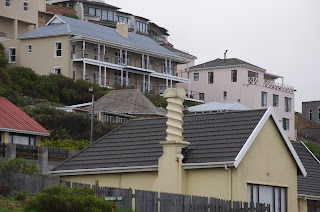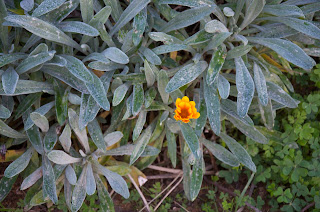Eagles Rising is a small organization in Somerset West that serves as a 'bridging' program--bridging the gap between third world and first world--both of which are present in South Africa. The students apply and are accepted for a 2 year program. Most come from area townships, but there were several students from George, which is closer to Port Elizabeth.
They sang for us, and the videos I took did not turn out for some reason, which was quite disappointing to me. These young people have incredible talent, and singing is such a part of their lives.
I wrote earlier about the killer trees--the blue gum and eucalyptus trees that they are in the process of cutting. It has been 18 days now since they first made me sick, and at times, I think I am still no better. Although yesterday was a fairly good day, the night and so far this morning has been miserable and all I want is to finish class and come home and go back to bed. My head feels like one of these logs--and I have coughed until I actually have bruises on my abdomen!

The trees sit at the base of the water shed for this valley so as the water comes down the mountain, the trees are sucking it out of the water table and preventing it from reaching the other areas needed. This is a good lesson of what happens when colonization occurs: colonists bring things that are not indigenous to the area, and the outcome is never good when it is not part of the ecosystem. I was explaining "kudzu" to our South African friends as one example. Believe it or not, one of the Mississippi students even said, "Kudzu? What's that?"
The students are doing tunnel gardening, and growing vegetables both for their own use on the farm and to be able to sell some. Due to the wind, insects, and other risks, gardens need to be enclosed.
Last year, just as the crop was maturing, the neighbor's cows knocked down the fence, came in and trampled all the tunnels and ruined the crop. The students are slowly rebuilding the tunnels, and had quite a few beds of vegetables doing well.
The following day, I was quite sick and it was cold and raining again as we headed over to Philani in Khayelitsha. I had gotten locked in the laundry room at Court and Lira's, and had a lot of time to think while waiting for rescue. Court and Lira's house is an older Cape Dutch style home, and the laundry room and shower are in an addition on the back of the house. Court had locked the back door without realizing I was in the shower, so when I came out of the shower, I could not get back in the house and they were gone to work.
It was one of those "Kodak moments." I knew eventually that the housekeeper would come, or that when I did not show up to get the students someone would walk over to find out why. I just wrapped up in my towels, sat down on the chair in the laundry room, and tried to take in the words of the Sunday sermon: rest, relax, and go slow. I did not really have a choice, but it also seemed like a good time to reflect on things.
I did realize that it would be important for future trips to interview students about how they handle disappointment, group living, lack of convenience, not always being able to have one's own way, nor the convenience of being at home when it comes to things like Internet, telephone, laundry, and transportation. Those were all significant issues, and things I seldom think about after having traveled to South Africa so many times and am just used to as "it is what it is."
I also knew that no matter what, you cannot make everyone happy. There are some people who can be happy in almost any situation, and some people who can not. I feel fortunate and blessed that in general, my nature is one of just take what comes, try to see the humor in it, and don't let things over which I have no control rob my joy of experiences. Kind of like getting locked in the laundry room. :) Okay, I am here, what can I now do while I am here? It was pretty funny when Juanita came in, and heard me calling. She first went up stairs, thinking perhaps I had fallen. She could not help herself at laughing when she found me in the laundry room, and had to call Court and Lira to tell them. I did ask Court that night to do me a favor the next morning, and not lock me out of the house. :)
Next up, an incredible visit to Eersterivier, Aunty Goliath, the hospital, and Mfueleni.































































